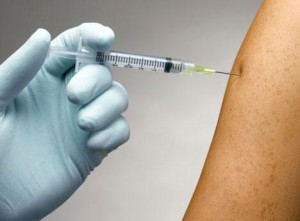Last week I talked to a bunch of retail food safety folks at FMI Foundation’s Retail Food Safety Forum about norovirus (and other stuff). Part of my message was that once the perfect human pathogen is in a restaurant, grocery store, or cruise ship, it’s tough to get it out without some illnesses.
Part of the problem with noro (beyond the low mean infectious dose; environmental stability; and, 10^9 virus particles per gram of vomit/poop) is a vomit event can lead to particles floating through the air. And maybe moving 30 feet from the barf splatter. Check out Grace Thompson’s vomit modeling apparatus (below, exactly as shown) for more.
According to WCNC, The Cowfish, a popular sushi and burger joint in Charlotte, is about to reopen following a noro outbreak affecting over 50 staff and patrons. Mecklenburg County Medical Director Dr. Stephen Keener says the working theory, according to is that a patron or food handler had the virus, brought it into the system, and spread it.
The Cowfish voluntarily closed its doors after norovirus is believed to have made about 50 people sick last week.
They original closed the doors to the restaurant as a precaution. The second time they closed, they brought in professionals to clean. Something they didn’t do the first time.
NBC Charlotte pulled up the most recent health inspection report. The restaurant was cited for hands not being clean and properly washed.
The health department still hasn’t found the cause of the illness and released this statement: ‘Cowfish management has been proactive and in constant contact with the Health Department.”
The owner of the restaurant calls this a regrettable situation and says, ‘We also will continue to work with health officials to be sure we are doing everything possible to protect the health and safety of our guests and employees.’
Bringing in some professionals who have compounds that are effective against noro (CDC advises 1000-5000ppm of chlorine for contaminated surfaces).


